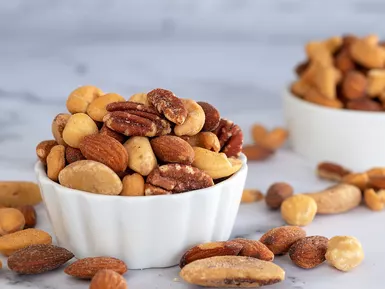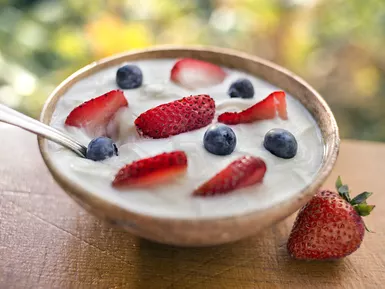
8 Non-Scale Victories to Celebrate During Your Weight-Loss Journey
Embarking on a weight-loss journey is a significant commitment that involves much more than just numbers on a scale. While the ultimate goal may be to shed pounds, it's essential to recognize and celebrate the non-scale victories along the way. These achievements not only boost motivation but also reflect the positive changes happening in your body and lifestyle. In this blog post, we'll explore eight non-scale victories to celebrate during your weight-loss journey and provide you with science-backed tips to help you stay on track.
1. Increased Energy Levels
One of the most common non-scale victories is an increase in energy levels. As you adopt a healthier diet and incorporate regular exercise into your routine, your body becomes more efficient at utilizing energy. This can lead to increased stamina, reduced fatigue, and a greater sense of overall well-being. To boost your energy levels, focus on consuming a balanced diet that includes plenty of fruits, vegetables, whole grains, and lean proteins. Additionally, make sure to stay hydrated by drinking plenty of water throughout the day.
2. Improved Sleep Quality
Another non-scale victory to celebrate is improved sleep quality. A good night's sleep is essential for overall health and well-being, and it can also play a role in weight loss. When you're well-rested, your body is better able to regulate hormones that control appetite and metabolism, making it easier to stick to your weight-loss goals. To improve your sleep quality, establish a regular sleep schedule, create a comfortable sleep environment, and avoid caffeine and electronics before bedtime.
3. Enhanced Mood and Mental Health
Losing weight can have a positive impact on your mood and mental health. As you shed pounds and improve your physical health, you may notice an increase in self-esteem, confidence, and overall happiness. Additionally, exercise has been shown to reduce symptoms of anxiety and depression, making it a powerful tool for improving mental health. To enhance your mood and mental health, make sure to incorporate regular exercise into your routine, practice stress-reducing techniques such as meditation or yoga, and seek support from friends, family, or a healthcare professional if needed.
4. Increased Strength and Endurance
As you continue to exercise and eat a healthy diet, you may notice an increase in strength and endurance. This can be particularly evident in activities such as weightlifting, running, or cycling. Increased strength and endurance not only make it easier to perform daily activities but also reduce the risk of injury and improve overall health. To increase your strength and endurance, focus on incorporating a variety of exercises into your routine, including strength training, cardio, and flexibility exercises. Additionally, make sure to gradually increase the intensity and duration of your workouts over time.
5. Better Blood Sugar Control
Another non-scale victory to celebrate is better blood sugar control. A healthy diet and regular exercise can help regulate blood sugar levels, reducing the risk of developing type 2 diabetes. Additionally, maintaining a healthy weight can also improve insulin sensitivity, making it easier for your body to use insulin effectively. To better control your blood sugar levels, focus on consuming a balanced diet that includes plenty of fruits, vegetables, whole grains, and lean proteins. Additionally, make sure to stay active and monitor your blood sugar levels regularly.
6. Improved Cholesterol Levels
A healthy diet and regular exercise can also have a positive impact on your cholesterol levels. By reducing your intake of saturated and trans fats and increasing your intake of unsaturated fats, you can lower your LDL (bad) cholesterol levels and increase your HDL (good) cholesterol levels. Additionally, exercise has been shown to increase HDL cholesterol levels, further improving your overall cardiovascular health. To improve your cholesterol levels, focus on consuming a balanced diet that includes plenty of fruits, vegetables, whole grains, and lean proteins. Additionally, make sure to stay active and monitor your cholesterol levels regularly.
7. Reduced Inflammation
Chronic inflammation has been linked to a variety of health conditions, including obesity, diabetes, and heart disease. By adopting a healthy diet and lifestyle, you can reduce inflammation in your body and improve your overall health. To reduce inflammation, focus on consuming a diet that is rich in fruits, vegetables, whole grains, and lean proteins, and that is low in processed foods, saturated fats, and sugar. Additionally, make sure to stay active, manage stress, and get enough sleep.
8. Increased Self-Esteem and Confidence
Finally, one of the most significant non-scale victories to celebrate is an increase in self-esteem and confidence. As you lose weight and improve your physical health, you may notice a positive change in the way you feel about yourself. This can lead to increased self-esteem, confidence, and a greater sense of overall well-being. To increase your self-esteem and confidence, focus on setting realistic goals, celebrating your achievements, and surrounding yourself with positive people who support your weight-loss journey.
Unique Insights for Weight Loss
Tailoring Your Approach to Your Metabolic Type
Not everyone has the same metabolic rate, and understanding your metabolic type can help you tailor your weight-loss approach to your specific needs. For example, if you have a slow metabolism, you may need to focus on consuming fewer calories and increasing your physical activity level to see results. On the other hand, if you have a fast metabolism, you may be able to consume more calories and still lose weight. To determine your metabolic type, you can consult with a registered dietitian or personal trainer who can help you develop a personalized weight-loss plan.
Breaking Through Weight Loss Plateaus
Weight loss plateaus are a common challenge that many people face during their weight-loss journey. When you reach a plateau, it can be frustrating and demotivating, but it's important to remember that it's a normal part of the process. To break through a weight loss plateau, you may need to make some adjustments to your diet or exercise routine. For example, you could try increasing the intensity or duration of your workouts, changing up your exercise routine, or reducing your calorie intake. Additionally, it's important to stay consistent and patient, as it may take some time to see results.
Science-Backed Tips for Weight Loss
Follow a Balanced Diet
A balanced diet is essential for weight loss. Focus on consuming plenty of fruits, vegetables, whole grains, lean proteins, and healthy fats. Avoid processed foods, sugary drinks, and excessive amounts of saturated and trans fats. Additionally, make sure to control your portion sizes and eat regular meals and snacks throughout the day.
Incorporate Regular Exercise
Regular exercise is also important for weight loss. Aim for at least 150 minutes of moderate-intensity aerobic exercise, such as brisk walking, cycling, or swimming, per week. Additionally, include strength training exercises, such as weightlifting or bodyweight exercises, at least two days per week. Exercise not only helps you burn calories but also helps you build muscle, which can increase your metabolism and help you burn more calories at rest.
Stay Hydrated
Drinking plenty of water is essential for weight loss. Water helps you feel full, reduces your appetite, and helps your body flush out toxins. Aim to drink at least 8 glasses of water per day, and more if you are exercising or sweating heavily.
Get Enough Sleep
Getting enough sleep is also important for weight loss. When you are sleep-deprived, your body produces more of the hormone cortisol, which can increase your appetite and lead to weight gain. Aim to get 7-8 hours of sleep per night, and establish a regular sleep schedule.
Manage Stress
Stress can also contribute to weight gain. When you are stressed, your body produces more of the hormone cortisol, which can increase your appetite and lead to weight gain. To manage stress, try practicing relaxation techniques such as meditation, yoga, or deep breathing. Additionally, make sure to take time for yourself each day to do things that you enjoy.
Success Story: How [Name] Lost [Weight] and Kept It Off
[Name] was struggling with her weight for years. She had tried countless diets and exercise programs, but nothing seemed to work. Finally, she decided to take a different approach and focus on making sustainable lifestyle changes. She started by consulting with a registered dietitian who helped her develop a personalized meal plan that was rich in fruits, vegetables, whole grains, and lean proteins. She also started exercising regularly, incorporating both cardio and strength training into her routine. Over time, [Name] lost [weight] and kept it off. She now feels more confident, energized, and healthy than ever before.
One-Day Weight Loss Meal Plan Example
Breakfast
- Oatmeal with berries and nuts (300 calories)
- Hard-boiled egg (70 calories)
- Black coffee or tea (0 calories)
Lunch
- Grilled chicken salad with mixed greens, tomatoes, cucumbers, and feta cheese (350 calories)
- Whole grain roll (100 calories)
- Water or unsweetened tea (0 calories)
Dinner
- Baked salmon with roasted vegetables (400 calories)
- Quinoa or brown rice (150 calories)
- Green tea or water (0 calories)
Snacks
- Apple slices with almond butter (200 calories)
- Carrot sticks with hummus (150 calories)
Total calories: 1,620
Beginner's Guide to Fat-Burning Exercises
Cardio Exercises
- Brisk walking: Start with 10-15 minutes of brisk walking per day and gradually increase the duration and intensity over time. Aim for at least 30 minutes of brisk walking per day, five days per week.
- Cycling: Cycling is a great low-impact cardio exercise that can help you burn calories and improve your cardiovascular health. Start with 10-15 minutes of cycling per day and gradually increase the duration and intensity over time. Aim for at least 30 minutes of cycling per day, five days per week.
- Swimming: Swimming is another great low-impact cardio exercise that can help you burn calories and improve your cardiovascular health. Start with 10-15 minutes of swimming per day and gradually increase the duration and intensity over time. Aim for at least 30 minutes of swimming per day, five days per week.
Strength Training Exercises
- Squats: Squats are a great exercise for targeting your lower body muscles, including your quadriceps, hamstrings, and glutes. Start with 2-3 sets of 10-12 squats per day and gradually increase the number of sets and reps over time.
- Lunges: Lunges are another great exercise for targeting your lower body muscles. Start with 2-3 sets of 10-12 lunges per day and gradually increase the number of sets and reps over time.
- Push-ups: Push-ups are a great exercise for targeting your upper body muscles, including your chest, shoulders, and triceps. Start with 2-3 sets of 10-12 push-ups per day and gradually increase the number of sets and reps over time.
Frequently Asked Questions
How can I stay motivated during my weight-loss journey?
Staying motivated during your weight-loss journey can be challenging, but there are several things you can do to stay on track. First, set realistic goals for yourself and break them down into smaller, achievable steps. Celebrate your achievements along the way, no matter how small they may seem. Additionally, find a support system, such as a friend, family member, or weight-loss group, to help you stay accountable and motivated. Finally, focus on the non-scale victories, such as increased energy levels, improved sleep quality, and enhanced mood, to help you stay positive and motivated.
What should I do if I'm feeling hungry between meals?
If you're feeling hungry between meals, there are several things you can do to satisfy your hunger without derailing your weight-loss goals. First, make sure you're eating enough protein, fiber, and healthy fats at each meal to help you feel full and satisfied. Additionally, try snacking on fruits, vegetables, nuts, or seeds, which are high in nutrients and low in calories. Finally, make sure you're drinking plenty of water throughout the day, as thirst can often be mistaken for hunger.
How can I overcome a weight loss plateau?
If you're experiencing a weight loss plateau, there are several things you can do to break through it. First, make sure you're still in a calorie deficit by tracking your food intake and exercise. If you're not, try reducing your calorie intake or increasing your exercise intensity. Additionally, try changing up your exercise routine to challenge your body in new ways. Finally, make sure you're getting enough sleep, managing stress, and staying hydrated, as these factors can also affect your weight loss.
Conclusion
Celebrating non-scale victories is an important part of your weight-loss journey. By recognizing and celebrating the positive changes happening in your body and lifestyle, you can stay motivated and focused on your goals. Remember to be patient, consistent, and kind to yourself, and don't be afraid to seek support from friends, family, or a healthcare professional if needed. With the right mindset and approach, you can achieve your weight-loss goals and live a healthier, happier life.
Call to Action
This week, start by making small changes to your diet and lifestyle. Try swapping out sugary drinks for water or unsweetened tea, and make sure to include plenty of fruits, vegetables, whole grains, and lean proteins in your meals. Additionally, try incorporating some form of physical activity into your daily routine, such as taking a walk, going for a bike ride, or doing a strength training workout. Remember, every small change counts, and over time, these changes can add up to big results. So, start today and take the first step towards a healthier, happier you!

5 Transformative Weight-Loss Resolutions for Success

Workout Routines & Beyond: Science-Based Weight Loss

Vitamin E and Weight Loss: Unveiling the Truth

Effective Strategies to Lose Midriff Fat for Women

8 Non-Scale Victories in Your Weight-Loss Journey

Unveiling the Ornish Diet: A Path to Sustainable Weight Loss

The Power of Social Support in Weight Loss

Personalized Weight Loss: 4 Strategies for Success

Long - Term Weight Loss: Maintaining Healthy Habits

